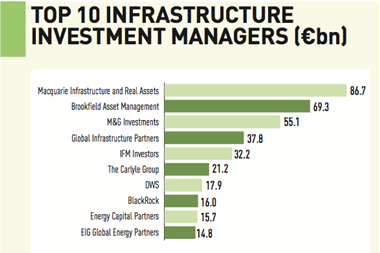The European Investment Bank (EIB) is a lead investor alongside Crédit Agricole Assurances and 15 other mainly French institutions in what it describes as an “innovative” 25-year, buy-and-hold green-energy equity fund structure launched by Amundi Energy Transition (AET).
The closed-end fund, Energetic Transition, has already made five climate change-related investments with Dalkia, a specialist in energy services and local heating networks in France.
It is based on a sourcing agreement with EDF, whereby the fund has the right to first offer of mainly greenfield investment projects where EDF is seeking an equity partner to buy an asset or bid for a public contract.
The first investments of around €400m, including leverage, have financed energy transition plants for industrial sites and local authorities in France, such as combined heat-power plants, including two large-capacity biomass plants.
Because these projects are offered at local level they do not tend to attract conventional financing.
“[EDF] provide us with a pipeline of assets that is very long and hard to reach because they are very small,” Matthieu Poisson, CEO of AET, told IPE Real Assets.
The fund is now closed to subscriptions, having raised €400m with a further €200m expected by the end of the year. With leverage, the investment capacity stands at around €2bn.
Some 75% of the investment will be targeted at core Europe, with the remaining 25% “close to home”, most likely central Europe.
Poisson said the fund had been conceived with Solvency II infrastructure investors in mind due to the built-in optimisation of the capital charge and he contrasted it with a typical private equity structure.
He said: “We don’t have execution risk in the sense of private equity, in terms of increasing cash flows, because we are in a stable tariff environment with mainly regulated assets.”
The buy-and-hold structure over 25 years means the fund will not resell assets. The gross annual return is estimated to be 9-10% with yearly asset amortisation of 4-5%. It is eligible for the Juncker plan, meaning it can target riskier assets.
Ambroise Fayolle, vice president of the EIB, told IPE Real Assets it was an innovative model, and pointed to the institution’s ability to crowd in further investments. The bank’s investment is €50m.
The vice president said: “We are important in terms of what we call crowding in, making sure we can facilitate and accelerate fundraising and we decided to be in at an early stage so we could be part of the selling argument for the fund.
“This kind of structure we find interesting in terms of concept and there is no reason why it could not be done in other countries.”
A key attraction, according to Fayolle, is the fund’s alignment with the EIB’s political objective to boost greenfield construction-phase infrastructure investment.
Fayolle added: “There is plenty of money for brownfield projects and we do that sometimes where there is specific interest, but greenfield is more difficult to get financing. We think our mission is there [in greenfield] and we have support from the Juncker plan for this.”
AET also hopes that the EIB’s onerous assessment and due diligence process underpins the robustness of the fund’s infrastructure and green energy credentials.
Fayolle continued: “The due diligence process means we are challenging the teams of the projects we are invested in. We found the concept quite interesting; it also partners the financial sponsor with an industrial sponsor.
“The fact there is this option to co-invest in projects presented by the sponsor we find interesting and probably replicable.
“For us, it is an innovative project and the magnitude of the investment we can anticipate for this fund makes it a very attractive for is in terms of effectiveness.”
The EIB is lagging its climate-change related investment targets, Fayolle noted.
Speaking at the Amundi World Investment Forum in Paris late last month, Fayolle also pointed to the EIB’s activities alongside the IFC and the EBRD to stimulate the growth of green bond markets in emerging markets.
The asset manager AET is jointly owned by Amundi and EDF.















